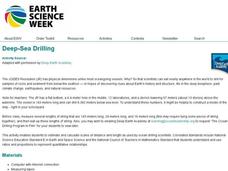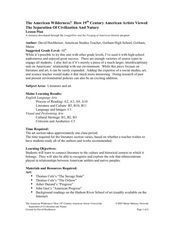Curated OER
Agriculutre and Natural Resources Trends
Students write the letters of the alphabet down the side of a piece of paper. They brainstorm words relating to agriculture that begin with each letter of the alphabet. Students discuss the slides from the PowerPoint presentation.
Curated OER
History of Natural Resources in the U.S.
Students define conservation, exploitation and preservation, identify legislation related to conservation and environmental issues, and identify leaders and organizations that were key to the conservation and environmental movements.
Curated OER
Air Pollution
Students seek solutions to environmental problems. They discover how to conserve and protect natural resources. They examine the role of acid rain on plants and discover how to filter pollutants.
Curated OER
Poverty and Natural Disasters: Exploring the Connections
Students explore the connections between natural disasters and poverty. In this economic activity students examine worksheets and activities for each level.
Curated OER
Biomimicry, Nature: Architecture of the Future
Students explore the relationship between nature and architecture. In this cross curriculum history, culture, and architecture lesson, students observe and discuss structures visible in nature. Students view websites in which Native...
Curated OER
Art, Naturally
Students read an online article which examine different works of art. They study how patterns and shapes found in nature influence art. Finally, they create original works of art and write artist's statements.
Curated OER
It's Art ... Naturally
Students consider the ways nature has been used in art, and then design and create their own original sculptures using materials from nature for a class exhibit.
Curated OER
Deep Sea Drilling
Students explore ocean vessels that drill the ocean floor. For this ocean drilling lesson, students watch videos about drilling the ocean floor and discuss. Students get into groups, go outside and use string to mark off the amount of...
Curated OER
Cycles in Nature
In this nature cycle learning exercise, students complete 12 word scrambles and 4 fill in the blank questions about the different cycles of nature.
Curated OER
Transportation
Engage in an 8-day study of different modes of transportation. Your students explore the concept of location and define the physical characteristics of places, such as, land forms, bodies of water, natural resources, and weather.
Captain Planet Foundation
Rotting Away
What happens at the end of a plant's life cycle? Show kids the natural way that plants show that they're decomposing, as well as the importance of compost, with a lesson about living organisms. After reading Log Cabin by Anne Schreiber,...
Odell Education
Reading Closely for Textual Details: Grade 12
Help your class examine humanity's unpredictable nature through "Life Steps Almost Straight." Learners read various works from philosophers such as Viktor Frankl, The Buddha, and Nietzsche to gather textual evidence and explain their...
CK-12 Foundation
Zero Product Principle
Some lessons feature videos, some interactive practice problems, and some have notes and activities. This comprehensive look at factoring and solving polynomial equations using the zero product principle has all of this and more. Though...
Walt Disney Company
Disaster Preparedness Activity Book
Join the American Red Cross as well as Mickey and friends as they help to prepare young scholars for natural disasters. After reading brief informational passages about earthquakes, floods, fires, storms, tornadoes, and hurricanes,...
Crafting Freedom
Frances Ellen Watkins Harper: Lover of Literacy
This, the sixth in a series of 10 related resources, examines the life and works of Frances Ellen Watkins Harper, an African American author, born in 1825, who advocated literacy for both free and enslaved African Americans.
Livaudais-Baker English Classroom
Kindred
This first in a series of four resources is designed for instructors to use Octavia E. Butler's Kindred in their classes. The packet includes an overview of the unit, a day-to-day calendar, links to background articles, and reading...
Curated OER
Renewable vs. Non-Renewable Resources
Fifth graders, after brainstorming why conservation of resources is important, distinguish between renewable and non-renewable resources. They make a list of different types of natural resources on the board and then sort them into two...
Curated OER
Natural Features as a Resource
Students investigate how land and water can meet basic needs. In this natural resources lesson, students locate water features on a Landscape Picture Map and describe how water is used to meet their needs.
Curated OER
Water Pressure - Disparity of Resources
Learners examine the disparity of resources between developing and industrialized nations, and research the problem of water availability as world populations increase and natural resources are stressed.
ARKive
Natural Selection- the Peppered Moth
Can human activity cause animals to evolve? Your budding biologists will find out the answer to some of the big questions in natural selection with a peppered moth activity. They will watch a few short videos, look at pictures, and...
Curated OER
Natural Selection
Kids act as scientists and preditors in this short natural selection activity; they collect and analyze data, then apply their new knowledge to real-world examples of natural selection. The layout of the worksheet is easy enough to use...
Teach Engineering
Biomimicry and Sustainable Design - Nature is an Engineering Marvel
Discover how copying nature can be beneficial to humans. Scholars read articles about examples of biomimicry and its potential applications. Along the way, they learn about Nature's Nine Laws and how they relate to biomimicry. This is...
American Battlefield Trust
Antietam 360
It was the single bloodiest day in Civil War history. Now, class members have the opportunity to walk in the footsteps of soldiers who fought in the Battle of Antietam using an interactive website. Supplemental resources include...
Curated OER
The American Wilderness? How 19th Century American Artists Viewed the Separation of Civilization and Nature
The attitudes of European settlers toward the American wilderness, as reflected in art and literature, is the focus of this resource packet designed for teachers. Included in the unit overview you will find lists or paintings and works...
Other popular searches
- Conserving Natural Resources
- Brazil Natural Resources
- Canadian Natural Resources
- New York Natural Resources
- Finite Natural Resources
- And Natural Resources
- Alberta's Natural Resources
- Natural Resources of Water
- Alaska's Natural Resources
- East Asia Natural Resources
- Conserve Natural Resources
- Natural Resources Michigan

























